Greece is one of the best places to move abroad if you seek sunshine, a slower pace of life, and a good value-for-money destination. The Greek island of Crete, located in the Aegean Sea and part of the Eastern Mediterranean, is especially popular with expats.
Crete offers sun, fun, good food, culture, and a very relaxed way of living.
Many expats have already taken the plunge and headed to the stunning Greek island of Crete. In this guide, we’ve done some digging to find out what it’s really like living on Crete as an expat all year round.
Secure Peace of Mind with Best-Value International Health Coverage
International Citizens Insurance provide free, no-obligation quotes from the leading international health insurance providers with plans tailored to meet your needs. Trusted by thousands of expats worldwide.
The pros and cons of living in Crete
Crete offers a wide range of benefits for anyone who decides to live there. However, just like any other place on earth, it does have a few drawbacks, too. It's good to know beforehand what to expect.
Before we start, here's one piece of advice: Greece and, therefore, Crete follow the Greek Orthodox church.
Many people, particularly the older generation, are strictly religious, and you could find yourself being judged for not respecting their religious holidays. And Crete celebrates lots of religious holidays; there is basically one a month. So be respectful and mindful of local traditions and culture.
The pros of living in Crete
The Mediterranean lifestyle is much more relaxed than in mainland Greece
Crete is an island that takes life at its own relatively slow pace. Crete offers a very healthy, active lifestyle for those who wish to embrace the great outdoors.
As a small island, Crete has a strong sense of community and can often feel like a very large town where most people know each other. However, the island is large enough to have everything you might need.
Beautiful landscapes, sandy beaches, and walks
Crete has a varied landscape with mountains dotted with tiny villages and hamlets contrasted by larger towns such as Heraklion and Chania. The Northern coast of Crete is home to attractions like the Knossos Palace and the stunning Balos Lagoon, known for its crystal-clear turquoise waters and silky white sand.
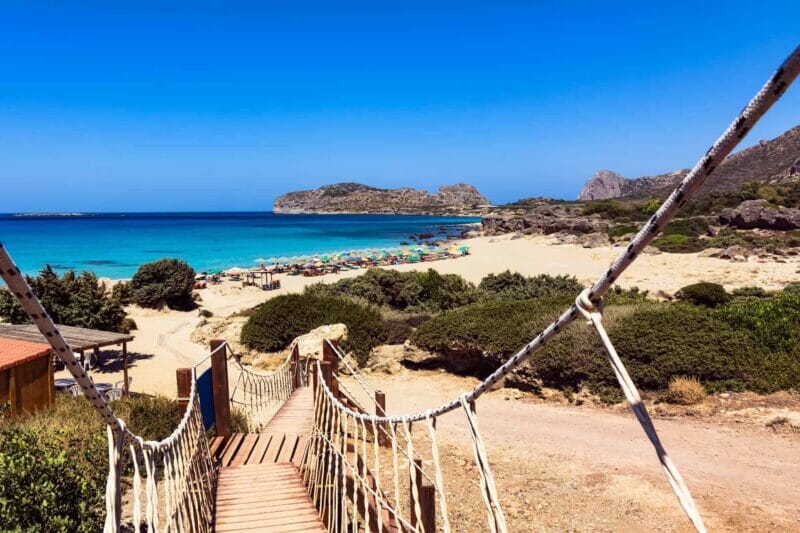
Just a short drive from Kissamos, Falasarna Beach is famous for its crystal-clear water, which is perfect for snorkeling. Crete also offers sunny, sandy beaches, which are a major draw for tourists and residents alike.
Good quality of life and natural beauty
The quality of life in Crete is generally considered to be excellent. Although life moves slower than in other places in Europe, Crete still has everything you need to live comfortably.
5. Fresh and healthy food
Plenty of delicious food is grown on the island, and the Greek diet is well-known for its fish, simple dishes, and fresh produce.
Food isn’t overly expensive unless you are looking for something very specific. Some things need to be bought over on ferries from the mainland, so they can be pretty pricey.
It’s worth checking what you’ll need before you move so you don’t end up paying for overpriced goods.
If you know what you are in for and have done plenty of research, moving to Crete may be the best decision you make.
The cons of living in Crete
Moving to Crete will not have the same culture shock as moving to somewhere like Japan. Most things are very similar to other European countries. However, there are some quirks and abnormalities that are worth knowing before you go.
1. Be patient when dealing with bureaucracy
Life in Crete moves at a slower pace than in other places, particularly when it comes to paperwork.
If officials say they'll get back to you within five days and they don't, don't be surprised. Nothing is wrong; it just takes a while.
You should allow for extra time when meeting deadlines and don't try to do anything in a rush, especially in the summer.
2. Don't count on things to be done at lunchtime
In the summer months, when the middle of the day is very hot, many people take a long lunch.
This means that if you want to go to any shops or visit anyone between 12-2 PM, call in advance to check it's okay, or you might find the stores are closed and your neighbor is taking a nap.
Because of the long lunch break, afternoons in Crete can last until about 9 PM. If someone says they'll be there in the afternoon, ask for a specific time or be prepared; they could turn up at 7 PM.
3. Adapt to hectic driving
Because Crete is relatively relaxed, they sometimes don’t respect even the most basic rules of the road. Driving in Crete can be terrifying and unpredictable compared to the driving standards in most European countries.
If you plan on getting a car, which is recommended as public transport is good in the town but unreliable elsewhere, be ready for some unorthodox driving.
People may indicate one way and then turn another, drive up the other side of the road, stop to have a chat, or even ignore traffic lights.
4. Get used to stray animals
Finally, Crete is home to many stray animals. Stray cats and dogs are familiar sights in the centers of large towns and even small villages.
It can be distressing to see them starving, and many people find it off-putting.
If you do choose to help these animals, be prepared to be surrounded by animals looking for food. Shelters on Crete are full, so contacting one is almost pointless.
Is Crete a safe place to live?
If you’re looking for a one-word answer, the answer is yes. Crete is a popular tourist destination, which contributes to its overall safety. The island is well-maintained and welcoming to visitors.
Of course, like all places, there are some slightly less safe parts, but in general, Crete is the type of place where you can spend an afternoon in your garden and not worry about locking your front door.
In fact, in some areas, such as Hora Sfakion and Souda, plenty of people head out to the local market or pop to their neighbors for coffee without locking up. Of course, if you do this, you have to accept the risk.
If you head into the larger towns like Chania and Heraklion, you’ll still feel very safe. Greek culture means evenings are spent visiting friends and drinking local Cretan wine in local bars and tavernas.
Generally walking or stumbling, the short distance home doesn’t leave you feeling unsafe or glancing over your shoulder.
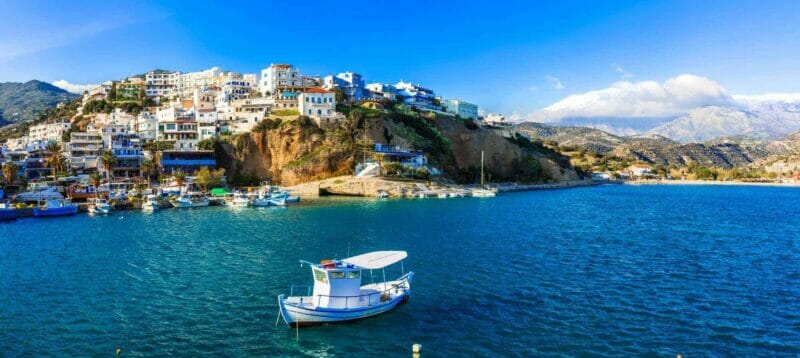
Agia Galini in the south of Crete has retained its authentic charm despite being very popular with tourists.
Many expats report feeling safer walking in Crete at night than in the US or the UK. In fact, most people say the only problem walking after dark is the potholes on the road, which might cause you to trip.
The few exceptions to the rule are some of Heraklion’s suburban areas, which can feel unsafe after dark.
However, there are minimal crime reports, and very few people experience anything dangerous. If you find yourself in these areas, you’re better off heading back to the town center’s bright lights.
If you generally avoid walking at night, public transport on Crete is considered safe, although not necessarily reliable!
The only thing you really need to consider regarding your personal safety is pickpockets during the summer months.
As more tourists head to the island, incidences of petty crimes like this arise, but they generally target tourists carrying around larger amounts of cash for holiday spending.
Keep an eye on your valuables in tourist spots such as The Palace of Knossos, and you’ll be totally fine.
How do I become a resident of Crete – non-EU citizens
If you plan to stay and/or work on the island for over three months, you must sort out your residency. Heraklion Airport is a major entry point for new residents.
Greece is not known for having a fast bureaucratic system, so you’ll want to allow as much time as possible to get the paperwork sorted.
After living in Greece for at least three months, you can apply to the Greek Aliens Bureau via the online website.
You will need your passport and proof of address, and some additional documents. Find more details on how to obtain residency in Greece in our Residency In Greece guide.
Whatever country you are moving from, your passport must have an extended expiration date. If it only has under a year left, renew it before you leave.
The Greek authorities can refuse your residency for this. A minimum of six months is required.
If you plan to study or work in Crete, you will need to apply for an additional permit, but this is less urgent than securing your residency.
The forms are relatively simple and require similar documents to the residency application. However, you might want to consider professional help.
Another good place to start is the Greece Ministry for Migration and Asylum website.
The easiest way to secure your residency
If you are a non-EU national, the easiest way for you to secure a European residency is to buy a property worth €250,000 and over. In this case, you can qualify for residency through investment (Golden Visa).
If you have questions or need more information about your Golden Visa options, we have a complete guide to EU Golden Visa Schemes, or contact us via our page on
Sorting out healthcare
No matter where you are moving from, you will have to make some arrangements for healthcare in Greece.
All legal residents are entitled to state-run healthcare. However, while applying for your residency and visas, you must have private health insurance.
Many expats opt for an international health plan. To make sure you get the best value for money,
Healthcare for UK citizens
Qualified UK citizens can apply for the S1 form, which will grant them access to the Greece public healthcare system paid for by the UK.
If you are not eligible for the S1 form, you will need to obtain private health insurance to be able to get residency.
To learn more, read our guide How To Access Healthcare When You Move Abroad – all you need to know about your post-Brexit healthcare options in Europe.
Retiring to Crete
If you are looking to move to Crete to enjoy the peace and quiet of your retirement years, then there is plenty to look forward to. Compared to other Greek islands, Crete offers unique experiences with its stunning beaches, excellent medical infrastructure, and a temperate Mediterranean climate. Crete is a great place to retire to at any age.
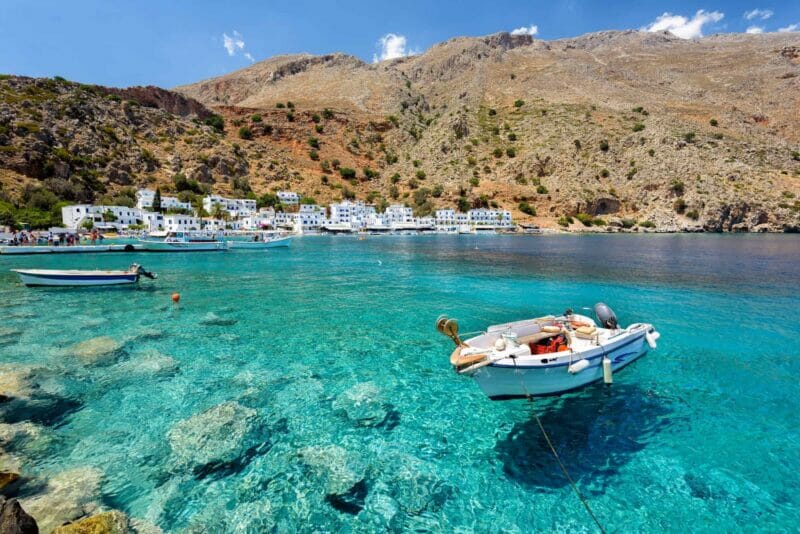
Loutro – one of the most picturesque villages in southern Crete
Of course, there is much on offer in terms of activities, sports, and keeping fit and healthy. But you’ll also find plenty of support.
Most expats who move to Crete in later life said their main concerns were the language barrier and healthcare.
Language can be a barrier at any age. Like most of Europe, locals on the island generally speak English for tourists and are more than happy to help if you try to speak in Greek.
It’s very common for locals to watch you struggle with a few words and then just respond with perfect English. You can take language classes with other expats if you move to a large town.
The other main concern of expats is healthcare.
Crete welcomed a brand-new hospital in Chania in 2000, and it’s modern and up-to-date.
Hospitals and medical centers are also in Heraklion, Rethymnon, Lassithi, Agios Nikolaos, Hania, and more. You won’t be short of medical care.
Crete also has several medical translators who can come to appointments with you and make sure you understand any prescriptions or procedures. But with such a great outdoor lifestyle and so much fresh Mediterranean food on offer, chances are you’ll remain healthy and feel younger than your years.
Crete has a very low crime rate, and the Greek culture means that you’re sure to get help as you age. The Greeks are very big on respecting their elders.
Life on Crete is gentler than on mainland Greece or much of Europe, which can be very enjoyable and perfect for retirement.
However, if you’re looking for a fast-paced lifestyle to keep you young, you might prefer one of the other islands or the mainland.
Crete’s slow pace also applies to the bureaucracy system, so if you suffer from high blood pressure or are looking to get away from stressful paperwork, perhaps take up meditation or yoga while filling in all your official forms.
The cost of living in Crete
Life in Crete can be a contradiction regarding the cost of living.
Some things, such as local foods, are dirt cheap, making day-to-day life very inexpensive.
However, because Crete is an island, more oversized items must be shipped from the mainland, adding to the price. A ferry trip from mainland Greece to Crete, specifically from the Athens port of Piraeus to Heraklion, takes between 8 and 9 hours and can add to the cost of transporting goods.
For things such as kitchen white goods, it is often cheaper to buy them in mainland Greece and bring them back yourself on a car ferry than to buy them on the island.
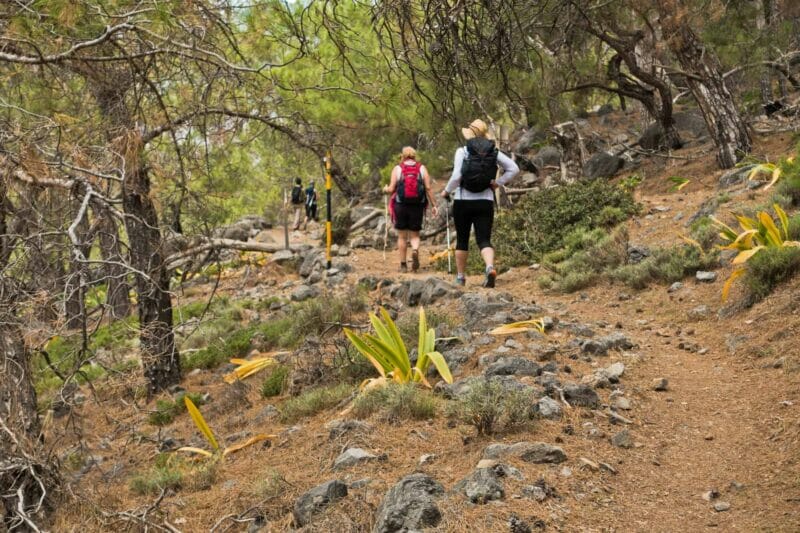
Trekking through a pine tree forest along the coastline on the e4 trail between Loutro and Agia Roumeli
Most expats say this is something they get used to very quickly, and they can efficiently work out the cheaper option. However, planning for this can be challenging and confusing.
When saving to move to the island, you’ll need to factor in how many things you can take with you. It might leave you with a fairly steep initial moving cost, but overall, it’ll be cheaper than buying new on the island.
The daily cost of life on the island is pretty cheap, especially when it comes to fresh, locally-grown foods. A decent bottle of local wine will only set you back around €4, and fresh bread costs under €2.
Even heading out to a local coffee store will only cost you €3 for a regular coffee. Other things are also reasonably affordable on Crete. A cinema ticket only costs around €7.50 and a bus ticket costs just €1.70.
Of course, not everything is cheap, and some things can’t be bought on the main island and shipped over.
The internet cost is around €40 per month, and the speed doesn’t compare to the internet in large cities.
Something like childcare can also be pretty pricy, almost €300 per month, and there aren’t many options.
Is property expensive in Crete?
Like everything else on the island, house prices vary massively. For a flat in a decent part of Chania, or any other major town, you're looking at €350 per month for one bedroom.
The proximity to amenities will cost you, but you'll pay even more to live just outside the tourist buzz in summer.
In the smaller villages, you can find huge villas that attract A-list celebrities and have a matching price tag. But a modest, modern house will set you back around €250,000.
If you don't want to buy immediately and are looking to rent before taking the plunge, you'll find more options in the larger towns.
Most rental properties in the smaller villages are for short holiday lets in the summer, so you might find a reasonable price for the winter months but would have to move before tourists arrive.
Like most islands, Crete can be pretty expensive to get going and get set up. However, once you've got everything sorted, it's a reasonably inexpensive place to live.
Crete vs. Cyprus
If you love the idea of living on a Mediterranean island, you may also have considered moving to Cyprus.
To be totally honest, they are very similar, with mountainous scenery, vineyards, and unique wildlife. Living on either island is the dream for many. However, several crucial differences could impact your choice.
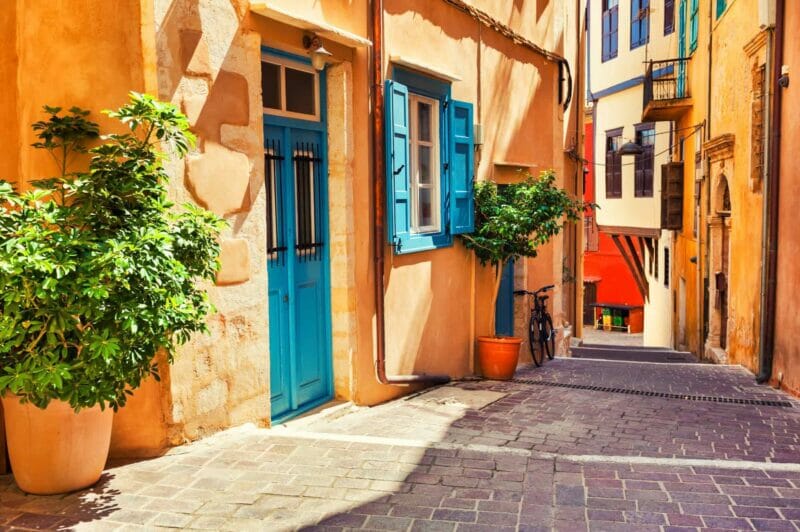
A typical old street in Chania, cozy and colorful.
First off, Cyprus is both more extensive and more densely populated. Over 1 million people live on the island for at least part of the year, while Crete is home to around 650,000.
Cyprus is also larger. It has a warmer climate, with summer temperatures averaging over 30 degrees Centigrade on most days. Crete is blessedly cooler (but still very warm), and in winter, the temperature drops, giving it a better winter season.
If you like the varying seasons, Crete is for you. If you want sun most of the year, perhaps living in Cyprus is more suitable.
Because of the stunning countryside, both islands are a dream for anyone who likes outdoor activities. There are many hiking and mountain biking trails, wildlife hot spots, and beaches.
If beaches are a deal-breaker for you, then you’re more likely to find soft white sand in Cyprus; some of Crete’s beaches can be a bit stony, so if you don’t know the beach, you might get a nasty surprise.
However, beaches like Balos, Elafonissi, and Falassarna still make Crete a perfect beachy location.
Both islands offer fantastic tasty local foods and drinks. The islands are large enough to grow some foods themselves which are always fresh and delicious. The rest has to be imported from the mainland.
Both islands offer very traditional Greek food featuring lots of fresh tomatoes, feta cheese, lamb, olives, wine, and plenty of seafood.
However, Cyprus also has some Middle Eastern and Turkish influences; you’ll definitely notice them if you choose to retire to Northern Cyprus.
Cyprus is also seeing more expensive fancy restaurants such as La Maison Fleurie pop up to cater to tourists, while Crete restaurants focus on good, fresh, cheap food.
Of course, you can find rather fancy meals in Crete too. Serenissima in Chania is a highlight.
Both islands have so much to offer in terms of history and culture, so realistically, either island is great to visit as a tourist. The Historical Museum of Crete in Heraklion and the Maritime Museum of Crete in Chania offer an overview of the island's modern history, covering periods from early Christian times to the present day, including World War II and the contemporary era.
However, Crete has more of a stereotypical Greek atmosphere. The island is packed with tiny villages and really feels like a Greek island.
Cyprus has slighter larger towns and can sometimes feel like one giant, spread-out city.
Cyprus and Crete are home to large expats communities, which shows precisely how wonderful both islands are to live on.
Whether you’ll prefer Cyprus to Crete is a matter of personal taste and what you’ve looking for in your new home.
You can find more about Cyprus in our Living In Cyprus – The Expats’ Guide.
Other expats in Crete
Crete is home to many expats from all over the world. You’ll find whole communities of expats sharing their knowledge and culture with other expats in tiny villages and pockets of the island.
Heraklion, the largest city on the island, is particularly significant for expats due to its size and the convenience it offers for living and job opportunities.
If you plan to move to Crete, you may decide to head to one of the remoter places such as Sissi or Kato Zakros.
Here you’ll be in the minority and will be surrounded by locals and other Greeks. This is a good way to immerse yourself in Greek culture fully.
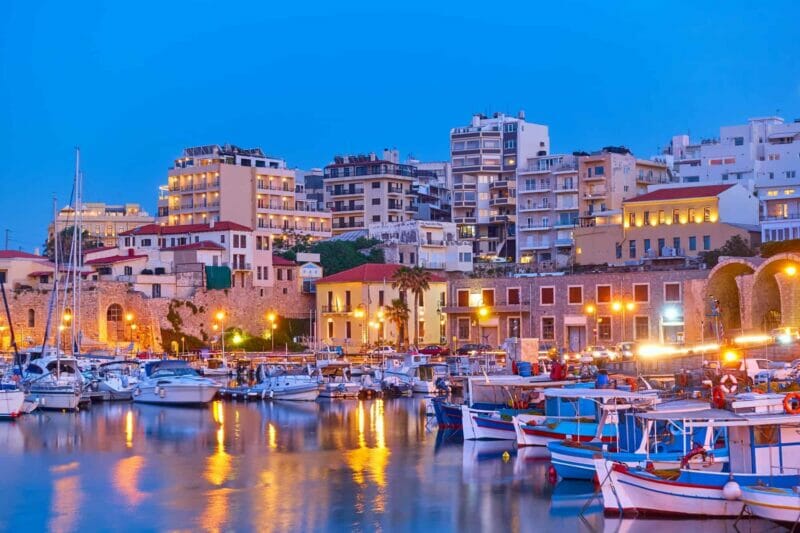
Heraklion city harbor with all its yachts and fishing boats, looks stunning at dusk
However, there is very little support from other expats if you live in one of these regions.
You can, of course, find online forums and ask for the advice of other expats, but if you want to meet up, join a community, and take advantage of the network of expats living on Crete, you might want to be in an area with a higher percentage of expats.
The area known as Apokoronas, situated between the major towns of Chania and Rethymnon, is home to the highest density of expats on the island.
Even the little villages have a smattering of expats, and the large town of Chania is just half an hour away by car.
Here you’ll find a strong sense of community among expats from different countries. You can find practical support and answers to any questions you might have and events and activities organized by expats, such as Coffee dates and trips to other islands.
The CIC (Cretan International Community) based in Rethymnon meets for coffee once a month and organizes activities, trips, and expat support.
Of course, Heraklion, in the east of Crete, also has a large community of expats. Heraklion is Crete’s capital, and so lots of expats here can help you will official and administrative tasks.
Community boards online offer a solid tie to other expats, with plenty of people looking for English-speaking work.
The expat community here is very interlinked. Although there is less of a sense of community than in other areas of Crete, the expats here will help you find anything from a job or a place to live to a date or even a new dishwasher.
You can also find a robust and active community of expats in Agios Nikolaos in East Crete. The INCO, The Cultural Organisation of the Foreign Residents of Aghios Nikolaos, is very busy and an excellent resource for expats in the area.
What is the best area in Crete to live in?
Crete is a very varied island, which means it has a lot to offer and is made up of very distinct areas. There is something for everyone, but only if you know where to look.
The northern coast of Crete is home to major attractions like the Knossos Palace and the stunning Balos Lagoon, known for its crystal-clear turquoise waters and silky white sand.
Honestly, every part of Crete is an excellent place to live, but depending on what sort of lifestyle you want, you will want to choose a part of the island that matches your lifestyle.
The west part of the island, especially the northwest near Chania, is stunningly beautiful, has the best beaches, and is thriving and bustling all year round.
The downside is that come summer; it is very touristy. Generally, all along the north coast of the island have excellent public transport, making it easier if you don’t drive.
Chania is a beautiful old town but is much smaller than Heraklion in the east.
If you want to live in a proper city while still experiencing Greek culture, Heraklion is best for you. You’re also more likely to find a job in Heraklion, and it’s much more modern and offers a busier lifestyle.
Moving to Heraklion or the surrounding area would be ideal if you want variety, nightlife, and plenty to do.
The island's south coast is less busy with tourists in summer, which is fantastic. It’s very picturesque and has more small villages compared to the north.
With the mountains of Crete protecting the southern coast, it is more difficult to access here and therefore is quieter, more traditional, and life is much slower.
Nightlife here amounts to a good selection of bars and restaurants, but you’d be pushed to find someone open for customers after 1 AM.
If you want to brush shoulders with celebrities and live the high life on the island, the northeastern village of Elounda is a charming fishing village turned playground of the rich and famous. House prices here are higher, but living here is a luxury.

Elounda, an up-and-coming retreat with a colorful harbor, is packed with authentic Greek tavernas and friendly bars and comes with a beautiful sandy beach.
If you don’t want to live on the coast, moving to the mountains offers a range of outdoor activities.
Life in the mountains is more similar to life in other Mediterranean countries, where the year is divided into growing and harvesting produce.
There are few major towns in the mountains, so you’ll get lots of peace and quiet and can descend into the hustle and bustle of the coast when you need to.
Crete is varied and diverse, meaning there really is a place for everyone. If you haven’t already fallen in love with one part of the island, we’d recommend traveling around a bit until you find the place that steals your heart.
Living in Crete in winter
Unlike some of the smaller islands, Crete doesn’t become a ghost town during the winter months. With ongoing activity and a strong sense of community, spending the winter on the island is a pleasure.
Crete has a large number of expats who live on the island all year round alongside the local population, so although the months between November and May are quieter, there is still plenty to do.
The winter months commemorate Crete's historical significance during World War II, particularly its resistance and impact on the Allies' victory.
The weather in Crete is pleasant in winter, hovering at around 10 degrees, although some of the mountains will get a dusting of snow.
The island does get a fair amount of rain, giving it the lush vegetation and ensuring it doesn’t become desert in summer. The cooler temperatures mean the winter months are often spent doing jobs that can’t be done in the summer heat.
Over the winter months, the island experiences a different kind of buzz due to lots of building, renovating, road repairs, shop changes, and more.
This is also the time of year for the olive harvests, which means long workdays and many meals with family, friends, and neighbors. It’s a great time of year to bond with locals and make yourself a part of the community on Crete.
Winter is also the time of year for one of Crete’s most famous and most enjoyable events. On January 6th, Crete celebrates Epiphany, the Holy Blessing of the waters.
This festival involves lots of ceremonies by the water, and you’ll find lots of swimming events. If you don’t fancy a dip in the cold sea, it’s a great spectator event, and you’ll have a great time with all the food, wine, and music.
Some of the main tourist attractions are closed for work in winter, so there are few tourists, and it’s a great time to explore the island, eat out and go shopping without being surrounded by tourists.
If you choose to live outside the major towns of Heraklion and Rethymnon, winter is a great time to explore the local area.
Cooler weather and fewer people mean you’re more likely to see wildlife, so many people actually prefer the off-season months to the summer.
If you live in Crete all year and don’t need to find everything into a two-week holiday window, you’ll find yourself enjoying the temperate winter months as much, if not more, than summer.
Final thoughts on living in Crete
Overall, Crete is one of the best islands to move to if you want a Mediterranean lifestyle. The island is rich in culture and packed full of traditional Greek monuments, traditions, and festivals. It’s small enough to have a real sense of identity and community but large enough to have everything you could need—although some things come at a price. Thanks to its proximity to the sea, scuba diving is one of the many leisure activities available in Crete.
The island is home to many expats from all across Europe and the rest of the world, meaning anyone looking to move to Crete in the future will find a warm welcome and plenty of support. Groups of expats can help provide practical support, such as finding a job and emotional support over coffee when the Greek bureaucracy gets too much.
If Crete sounds like the place for you, jump on a plane or a boat, and find out! You can spend three months getting a feel for the island before you need to apply for residency. For many people, living in Crete full-time is a dream come true. It’s certainly not a bad place to enjoy a glass of wine after a long day.
You might find helpful:
- Living In Greece As An Expat – the ultimate relocation guide full of practical information and tips on moving to Greece, from the pros and cons to visas and residency, to the cost of living, healthcare, and more.
- Visa And Residency Options In Greece For Non-EU Nationals.
- Didn't find what you were looking for or need further advice? Comment with your question below, and we will do our best to help.
- Ferry companies that connect mainland Greece to Crete: Anek Lines and Minoan Lines, serve this route throughout the year. Blue Star Ferries operates during the summer.
- British Vice Consulate Crete – www.gov.uk
- Crete schools with addresses and contact details – the site of the Regional Directorate of Primary and Secondary Education in Crete.
- Crete hospitals, health centers, regional clinics, and other information on healthcare – administration of the 7th Ministry of Health of Crete
Secure Peace of Mind with Best-Value International Health Coverage
International Citizens Insurance provide free, no-obligation quotes from the leading international health insurance providers with plans tailored to meet your needs. Trusted by thousands of expats worldwide.










